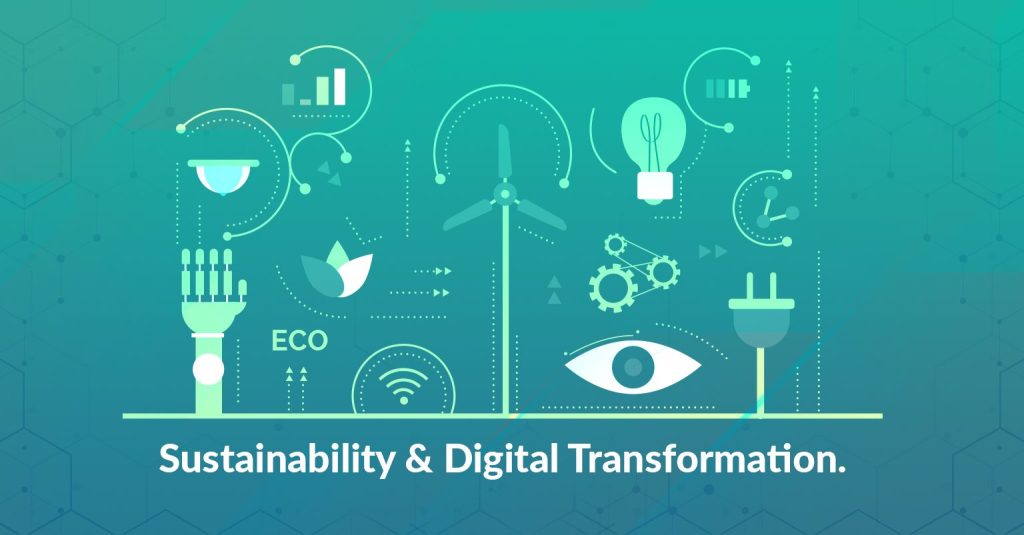In today’s rapidly evolving world, digital transformation has become an integral part of our lives, revolutionizing industries and reshaping the way we work, communicate and live. Simultaneously, sustainability has emerged as a pressing global concern, calling for immediate action to preserve our planet. The convergence of these two significant trends, sustainability, and digital transformation, holds immense potential for creating a greener, more sustainable future.
SquareOne stands at the forefront of sustainable digital transformation solution, recognizing the immense potential in the convergence of sustainability and digital technologies. Through innovative solutions, SquareOne empowers businesses to navigate the evolving landscape and create a greener, more sustainable future.
Understanding Digital Transformation
Digital transformation refers to the integration of digital technologies into various aspects of business operations, resulting in improved efficiency, enhanced customer experiences, and innovative business models. It encompasses the adoption of emerging technologies such as artificial intelligence (AI), the Internet of Things (IoT), cloud computing, and data analytics.
The need for sustainable digital transformation

As the environmental impact of human activities continues to escalate, sustainability has gained prominence on the global stage. Climate change, the depletion of natural resources, and pollution pose significant threats to the planet’s well-being. Organizations across industries are recognizing the need to embrace sustainable practices to mitigate environmental damage and create a better future.
Leveraging Digital Transformation for Sustainability
Digital transformation can play a pivotal role in achieving sustainability goals. Here are some key aspects of this convergence:
Smart Energy Management: By leveraging IoT devices, organizations can monitor and optimize energy consumption, reducing waste and carbon emissions. Smart grids, for example, enable efficient energy distribution and integration of renewable energy sources.
Circular Economy: Digital technologies facilitate the transition towards a circular economy by optimizing resource utilization, enhancing recycling processes, and enabling the sharing economy model. Through digital platforms, products can be tracked, traced, and repurposed efficiently, reducing waste, and promoting sustainable consumption.
Sustainable Supply Chain: Digital transformation enables end-to-end visibility in supply chains, ensuring transparency and accountability. Organizations can track and manage their supply chains more effectively, reducing emissions, improving logistics, and fostering sustainable sourcing practices.
Harnessing Emerging Digital Transformation Technologies: Creating Positive Environmental Change
Businesses across industries can leverage these technologies to adopt sustainable practices, reduce their environmental footprint, and contribute to a greener future. Let’s explore how companies can harness the power of emerging technologies to create positive environmental impacts.
Artificial Intelligence (AI) for Energy Efficiency: AI-powered algorithms can analyse vast amounts of data to identify patterns and optimize energy consumption. Businesses can leverage AI to monitor energy usage, detect inefficiencies, and suggest energy-saving measures. Smart grids, for instance, enable efficient energy distribution and integration of renewable energy sources, reducing reliance on fossil fuels.
Internet of Things (IoT) for Smart Resource Management: IoT devices enable real-time monitoring and control of resources, enabling businesses to optimize their usage and minimize waste. Sensors embedded in equipment can track energy, water, and resource consumption, allowing for proactive management. Smart agriculture systems, for example, leverage IoT to optimize irrigation, minimize water usage, and reduce chemical inputs.
Blockchain for Transparent Supply Chains: Blockchain technology provides a decentralized and transparent platform for supply chain management. It enables businesses to track and trace products throughout the supply chain, ensuring transparency and accountability. By verifying the origin and sustainability credentials of raw materials, businesses can make informed decisions about sourcing, promote sustainable practices, and reduce the environmental impact of their supply chains.
Cloud Computing for Green IT Infrastructure: Cloud computing offers businesses scalable and flexible IT infrastructure without the need for on-premises servers. This reduces the energy consumption and carbon footprint associated with maintaining physical servers. Additionally, cloud-based collaboration tools enable remote work and virtual meetings, reducing the need for extensive business travel.
Data Analytics for Sustainable Decision-Making: Data analytics enables businesses to gain valuable insights into their operations, identifying areas for improvement and sustainability enhancements. By analysing data related to energy consumption, waste generation, and resource usage, companies can make data-driven decisions to optimize their processes, reduce environmental impacts, and identify new sustainability opportunities.
Embracing these technologies not only benefits the environment but also enhances operational efficiency and competitiveness. It is time for businesses to embrace innovation and leverage emerging technologies as powerful tools for creating a sustainable and prosperous future.
SquareOne is at the forefront of driving sustainable digital transformation, empowering organizations to leverage digital technologies while minimizing their environmental impact.
Through our innovative solutions, we enable businesses to optimize their energy usage, reduce waste, and embrace circular economy principles.
At SquareOne, we are passionate about harnessing the potential of emerging technologies for positive environmental change. We believe that by embracing sustainable digital transformation, businesses can not only contribute to a healthier planet but also enhance their operational efficiency and competitiveness.
Join us on this transformative journey towards a more sustainable world. Together, we can shape a greener future by leveraging the power of digital transformation and sustainability. Explore the possibilities with SquareOne and be a part of the sustainable digital revolution.
Conclusion:
The symbiotic relationship between sustainability and digital transformation holds immense promise for building a greener, more sustainable future. By leveraging digital technologies, organizations can enhance their sustainability efforts, reduce their environmental footprint, and contribute to a healthier planet. SquareOne, with its commitment to sustainable digital transformation, serves as a catalyst in this journey towards a more sustainable world.
Contributed by : Minosh Salam, Director-SquareOne Technologies


















